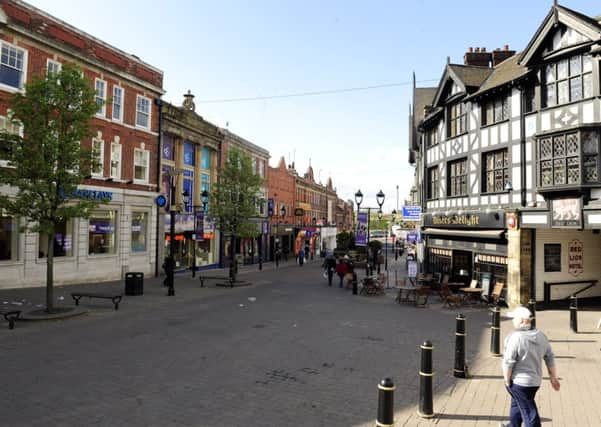We didn’t understand Rotherham child grooming problem, Ofsted boss admits


John Goldup, who joined Ofsted as director of social care in 2009 and was appointed deputy chief inspector in 2012, said that the watchdog did not focus as it should have done on the dangers of child sex exploitation in inspections in the South Yorkshire town.
Rotherham Council was last week taken under Government control and its entire political leadership resigned after the Casey Report’s withering indictment of its failure to tackle monumental levels of child sexual exploitation.
Advertisement
Hide AdAdvertisement
Hide AdLouise Casey’s report came after an inquiry by Alexis Jay last year found that more than 1,400 children had been subjected to rape, violence and trafficking by gangs of mainly Asian men over a 16-year period.
Giving evidence to the House of Commons Communities and Local Government Committee, Mr Goldup was asked whether he wanted to apologise to children in Rotherham.
The former deputy chief inspector stressed that he could not speak on behalf of Ofsted, but told MPs: “Yes I do. I agree entirely with what (Ofsted head) Sir Michael Wilshaw said to the Education Select Committee two weeks ago, that we didn’t get it right with child sexual exploitation in Rotherham. He apologised for that and I apologise for that.
“The inspection frameworks at the time didn’t have the focus on child sexual exploitation that they would and should have had if we had known and understood then what we know and understand now.
Advertisement
Hide AdAdvertisement
Hide Ad“It is clear from reading back over the inspection reports that we didn’t appreciate the scale of the child sexual exploitation issue in Rotherham and we didn’t scrutinise sufficiently the effectiveness with which it was being responded to.”
Mr Goldup added: “Having said that, I would also want to point out to the committee that it was when Ofsted first directly went in to do a social care inspection in Rotherham in 2009, it was an Ofsted inspection that for the first time exposed the failings in Rotherham and said very clearly that Rotherham was a failing authority.
“I think that does also say something about the strength and the robustness of Ofsted inspection then and subsequently, but I absolutely accept that we didn’t have the focus on child sexual exploitation that we certainly would and should have now.”
Mr Goldup told the committee that, until 2012, Ofsted operated under a framework which focused on the danger of child abuse within homes, rather than exploitation by adults outside the care setting.
Advertisement
Hide AdAdvertisement
Hide Ad“I think that our understanding of child sexual exploitation - and I’m not just talking about Ofsted but a national understanding - up to that time was that it was an evil that had surfaced in a small number of very specific places and very specific circumstances,” he said.
“We didn’t understand the scale and prevalence and scope of child sexual exploitation until 2012. I don’t think we understood that it almost certainly affects thousands of children all around the country and it could be happening in any local authority.
“There were a series of events in 2012 that fundamentally transformed our understanding of child sexual exploitation. By the end of 2012 we were inspecting for child sexual exploitation in a very different way.
“We needed to improve. We needed to learn. We didn’t get it right at the time we inspected Rotherham.”
Advertisement
Hide AdAdvertisement
Hide AdCommittee member Simon Danczuk said Ofsted inspectors should have been aware of previous child exploitation scandals in places like Derby and Blackburn.
“You guys are paid to be on top of this subject,” Mr Danczuk told Mr Goldup. “It’s your profession to know that this type of abuse goes on, to look at Blackburn in 2000 and think ‘This could be replicated elsewhere in the country’, to think ‘It’s happened in Derby, it could happen in other parts of the country, perhaps we should design a framework that tries to get to the detail of this’.
“But you took to 2012 to accept that the rape of children might be occurring outside the home. I don’t get it.”
Mr Goldup replied: “Our understanding of child sexual exploitation was limited. We knew it happened, we knew it was wicked, we knew it was hugely damaging to children, but it was widely perceived as a localised issue.”
Advertisement
Hide AdAdvertisement
Hide AdHe rejected Mr Danczuk’s claim that inspectors failed to react to social workers dismissing exploitation as a “lifestyle choice” of the teenage girls and boys in their care.
“If they had encountered that attitude from a single social worker, they would have followed that up like a pitbull in the inspection,” said Mr Goldup. “They would not have overlooked that.”
He added: “We now understand that the evil of child sexual exploitation is something that can be happening and is probably happening on some scale - because it covers a vast range of things from individual grooming of individual children to organised criminal activity.
“We do now understand that that may well be happening in any community in the country and all local authorities and partnerships need to be very, very alert to it and inspection needs to be alert to it.”
READ MORE...